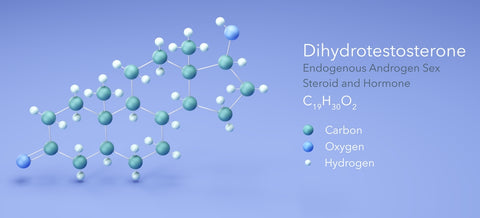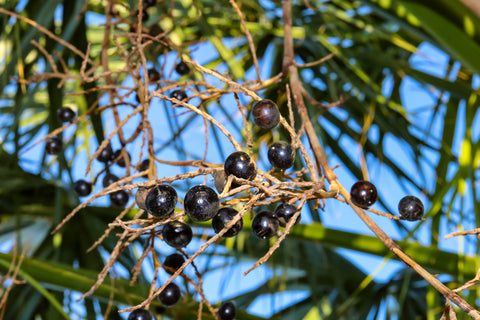DHT Blocking for Hair Health

Share
Dihydrotestosterone (DHT) is a hormone that's been identified as a primary factor in hair loss, particularly in cases known as androgenetic alopecia, or male and female pattern baldness. Understanding how DHT affects hair health and exploring ways to mitigate its impact can be crucial for those looking to maintain or improve their hair condition. In this article, we discuss the intricacies of DHT-related hair loss, examine the efficacy of various DHT blockers, and provide insights into natural methods to combat hair loss.
Understanding DHT and Hair Loss
DHT is a derivative of testosterone and is more potent. (1) It plays a significant role in various bodily functions, including hair growth. However, when DHT binds to androgen receptors on hair follicles, it can lead to a process known as miniaturization. This process gradually diminishes the hair follicle's size, leading to thinner hair and eventually resulting in hair loss. (2)
The connection between DHT and hair loss has been well-documented in scientific research. Individuals with a genetic predisposition to hair loss have hair follicles that are particularly sensitive to DHT. This sensitivity causes the hair growth cycle to shorten, and over time, the hair follicles stop producing new hair. (2)
DHT Blockers: A Solution to Hair Loss

DHT blockers are substances that can prevent DHT from binding to hair follicle receptors. By inhibiting this interaction, DHT blockers can slow down or even reverse hair thinning and loss. (3) There are several types of DHT blockers, ranging from prescription medications to natural supplements.
Finasteride and dutasteride are among the most well-known prescription DHT blockers. These medications specifically target the enzyme responsible for the conversion of testosterone to DHT. While effective, they can have side effects and are usually prescribed for male pattern baldness. Some of the common side effects of these medications include reduced libido, erectile dysfunction, ejaculation disorders, and, sometimes, psychological effects such as depression.
What Are the Best DHT Blockers?
When exploring DHT blockers, it's important to consider both efficacy and safety. The best DHT blockers are those that effectively reduce DHT levels without causing adverse side effects. Natural DHT blockers, such as saw palmetto, pumpkin seed oil, and green tea, have gained popularity for their ability to mitigate hair loss with minimal side effects.
Saw palmetto, in particular, has shown promising results in clinical studies, acting similarly to prescription medications by blocking or inhibiting the enzyme that converts testosterone into DHT. (4) Pumpkin seed oil and green tea are rich in antioxidants and have also been studied for their DHT-blocking properties as well. (5, 6)
Best Natural DHT Blockers

For individuals who are seeking a more holistic approach to hair health, there are several natural DHT blockers that stand out for their effectiveness and safety:
- Saw Palmetto: As mentioned, this plant extract is one of the most well-researched natural DHT blockers, often used in supplements for hair loss. We include saw palmetto as a primary ingredient in our Male Hormone & Prostate Support formula.
- Pumpkin Seed Oil: Studies have suggested that pumpkin seed oil can increase hair count and hair thickness in people with hair loss. (5)
- Green Tea: Rich in epigallocatechin gallate (EGCG), green tea can help reduce DHT levels and promote hair growth. (6)
- Nettle Root: Nettle root is another natural ingredient believed to block DHT production, available in various forms such as teas, capsules, and topical solutions. (7) We also utilize the therapeutic benefits of nettle root in our Male Hormone & Prostate Support formula.
These natural DHT blockers offer a gentler alternative to prescription medications and can be part of a comprehensive approach to hair health. Of course, it is recommended to consult with your doctor for the best approach to treatment for you.
How to Block DHT and Regrow Hair Naturally

Blocking DHT and regrowing hair naturally involves a holistic approach that involves making changes in diet, lifestyle modifications, and the use of natural DHT blockers. In some cases, particularly those attributed to genetic factors, hair loss may not be preventable or reversible. That being said, some of the best steps you can take to support your hair health and growth include:
1. Diet and Nutrition
Consuming a vareity of foods abundant in vitamins and minerals that are known to support hair health, such as Vitamin E, zinc, and iron, can help. Foods like nuts, seeds, leafy greens, and fish are excellent for supporting hair growth.
2. Scalp Health
Maintaining a healthy scalp environment is crucial. Regular cleansing to remove excess sebum and DHT from the scalp can help prevent hair follicles from miniaturizing. Utilizing a scalp microbiome shampoo can also help support hair health by maintaining a healthy balance of bacteria in the scalp microbiome.
3. Natural DHT Blockers
Incorporating natural DHT blockers into your daily routine through dietary supplements or topical applications can provide a non-invasive way to combat hair loss.
4. Stress Management
Stress is a known contributor to hair loss – so it is best to try to manage your stress and to keep your stress levels low by practicing stress-reducing activities like exercise, meditation, or yoga.
Bottom Line
DHT-related hair loss is a complex issue that affects many individuals. While DHT blockers, both synthetic and natural, offer hope for those struggling with hair loss, it's essential to approach your treatment with a holistic mindset. Incorporating a healthy diet, proper scalp care, stress management, and the use of effective DHT blockers can create a conducive environment for hair health and regrowth. As always, consulting with a healthcare provider before starting any new treatment is advisable to ensure it aligns with your individual health needs.
References
1 https://www.ncbi.nlm.nih.gov/pmc/articles/PMC6459338/
2 https://www.ncbi.nlm.nih.gov/pmc/articles/PMC4174066/
3 https://www.ncbi.nlm.nih.gov/pmc/articles/PMC7648777/
4 https://www.ncbi.nlm.nih.gov/pmc/articles/PMC10648974/
5 https://www.ncbi.nlm.nih.gov/pmc/articles/PMC4017725/